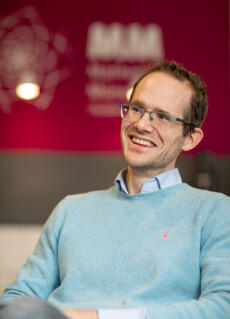Patience and perseverance

To be world chess champion – that was the plan when he was just eight years old. Although Gustav Holzegel did not achieve his aim, he can still be satisfied. The mathematician is a recognised expert in the field of General Relativity and has undertaken research at leading international institutes. Since November he has been a professor at the University of Münster supported by a recently awarded a Humboldt professorship, the most valuable research award in Germany.
Holzegel, now 40, enjoyed logical thinking from an early age – whether as a child playing chess or as a senior student at school who was fascinated not only by mathematics but also by the complex grammar of Latin and Ancient Greek. “My first preference was to study Business Mathematics, but then, by chance, I heard about a distance-learning degree course in Physics,” he says. And so, while he was doing his civilian service near his hometown of Hanover, he enrolled as a student in Kaiserslautern.
After taking his intermediate exams, he embarked on an international study programme in Mathematics and Physics at the University of Cambridge. “That’s where I fell in love with the General Theory of Relativity,” he says with a smile. “I often found the methods used in Physics too phenomenological and ad hoc – but pure mathematics wasn’t concrete enough. But this field of research combines the axiomatic aspects of Mathematics with the concrete description of processes in our universe – and so it plays a central role, and a fascinating one, for understanding our world,” he explains.
Luck certainly plays a role – but you shouldn’t wait for it to come knocking at the door – you can try to make it come to you.
After he returned to Germany, he wrote his diploma dissertation under the supervision of an expert in relativity theory in Freiburg. “After that, I had the good fortune to gain a place in Cambridge to do my PhD.” A little bit of luck, then: but what role does it play in a scientific career? “Luck certainly plays a role – but you shouldn’t wait for it to come knocking at the door – you can try to make it come to you,” Holzegel says. “If you’re really enthusiastic about a subject, it’s helpful to try and make contact with the important scientists working in this field and to switch locations, even if that entails some personal sacrifice. Because then you’re much more likely to experience fortuitous encounters than if you stay in one place all the time.”
Looking back, he considers meeting the mathematician Mihalis Dafermos a fortuitous encounter. “He suggested a special mathematical problem for my PhD thesis, which is how I moved from Physics to Mathematics. It was a decisive turning point for me – even though it entailed a great deal of work and patience on my part, as I had to teach myself a lot of mathematical methods and techniques.”
After gaining his PhD, Holzegel immersed himself in his research for four years in the peaceful surroundings of the elite University of Princeton in the United States before he got a fixed post at Imperial College, London – first as a lecturer, then as a professor. It was in London that he published research results which brought him international recognition, awards and funding.

His greatest success so far was a mathematical proof of the stability of black holes. His work is based on the so-called Einstein field equations. Albert Einstein put forward the complex system of partial differential equations over 100 years ago – as a description of gravitation in the language of differential geometry. “There is no complete solution for it,” says Holzegel, “but there are modern mathematical methods for understanding the dynamics of these equations in certain situations, for example in the vicinity of a black hole.”
There is a lot of work waiting for any researchers wanting to work towards a more complete understanding of the properties of the Einstein equations. “Patience and perseverance are very important here, because most ideas initially come to nothing. I’m grateful to my parents for attaching great importance to these qualities when I was young. I’m now trying to teach them to my own children too.”
For his move from London to Münster, the decisive role was played by the “Bridging the Gaps” professorship which the “Mathematics in Münster” Cluster of Excellence had advertised. “It’s an excellent fit,” he says, “as my research is not only closely related to Physics, but also links up a variety of fields from Applied Mathematics and Geometry.”
Another item on the list of arguments in favour of Münster was the quality of life there. “I always liked the hustle and bustle of London but, with two small children, more peaceful surroundings and being close to nature are worth a lot.” Another important aspect was that his wife was able to find a job at Münster University Hospital, in order to continue both her research in the field of neurology and also her specialist medical training.
Something that made a lasting impression on him was the spirit of optimism for the future, which he feels at Münster as a centre of mathematics. “There is a shared vision of what can and should happen here in the coming years.” It is something to which he wants to make his contribution – by using the prize money of the Humboldt professorship to hire talented junior researchers, attract scientists to Münster for research stays and organize international conferences. And, besides anything else, there will certainly be many opportunities for those fortuitous encounters which can be so decisive for the careers of young researchers.
This text was published in the university's newspaper "wissen I leben" [de] 02/03, 2021 (p. 7).
Links:
Prof. Dr. Gustav Holzegel: personal website and contact information
News (17.11.2020): "Mathematician Gustav Holzegel awarded a Humboldt professorship"

